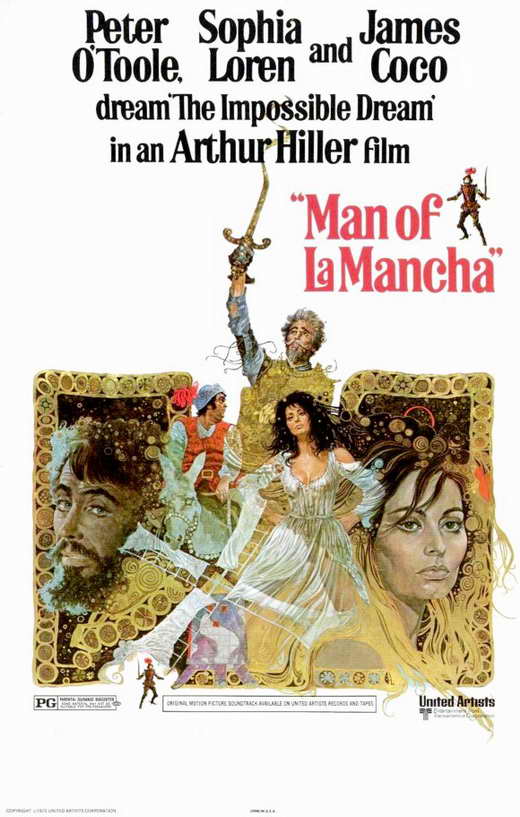To dream the impossible dream, that is the message (and frequently recurring lyric) that Miguel de Cervantes and Don Quixote (Peter O'Toole in a duel role) sing throughout Man of La Mancha, a 1972 movie-musical directed by Arthur Hiller. Costarring Sophia Loren as "Dulcinea" (Aldonza), Man of La Mancha is adapted from a stage-musical that was in turn (very) loosely adapted from the novel Don Quixote, Miguel de Cervantes' magnum opus.
The film opens with Cervantes and his friend being arrested by the inquisition while performing in the street, they are brought to a prison where they are sized up by the prisoners. The prisoners decide to hold a "trial" to determine if they are worthy or not; instead of a proper defense, Cervantes decides to put on a show performing the tale of Don Quixote with the prisoners as his troupe of players. His story begins with Don Quixote and his portly squire Sancho Panza riding in the countryside in search of adventures befitting a knight errant. After a battle with a savage giant (or windmill, depending on your level of sanity) he comes across an inn (castle) where he meets Aldonza ("Dulcinea"), a woman willing to do whatever it takes to survive. As Don Quixote attempts to rid the world of evil through ill-conceived acts of chivalry, his worried family decides that they should take it upon themselves to cure him of his sudden bout with insanity; all the while, Cervantes waits to be brought before the inquisition.
It must be said that Peter O'Toole and Sophia Loren would have been perfect casting if this had not been a musical, but it is a musical, and that is where the problem lies. The singing voices of O'Toole and Loren are clearly dubbed over, and not even with exceptionally good singing voices. This, combined with poorly (and hardly) choreographed dance sequences, resulted in a series of thoroughly lackluster and underwhelming musical sequences. The music in the film is passable, but hardly special when compared with music from superior musicals such as West Side Story.
The largest problem that Man of La Mancha has is that it does not know what the message that it is promoting is. The two separate messages it promotes are as follows: art is useful to prevent people from noticing their true problems (which is a great oversimplification of art's purpose) and that delusions are okay as long as they lead to some sense of purpose (even if the delusions are dangerous). There are very few problems with a film that can be as fatal as not knowing what it is about (and Man of La Mancha does not have a clue).
In the end, there is only one thing that can really be said about this film: it is a failure. Despite a cast of experienced character actors, and a pair of immensely talented leads, Man of La Mancha fails to live up to both the stage play and the novel it was based on. I once had an impossible dream as well: I dreamed that this was a good film.
3/10
Note: This review was previously posted on another blog I wrote.


No comments:
Post a Comment